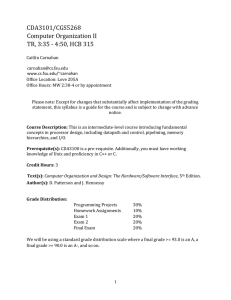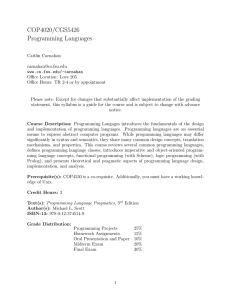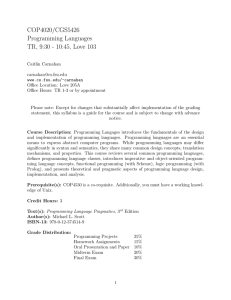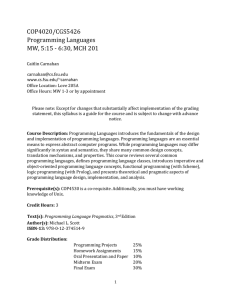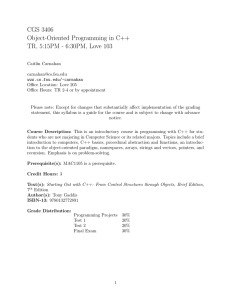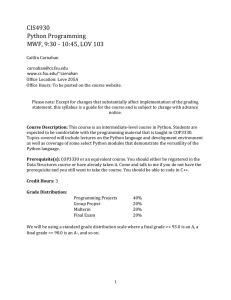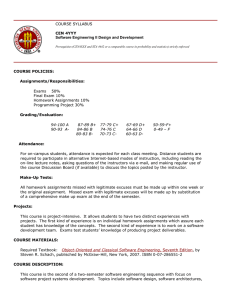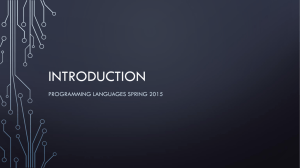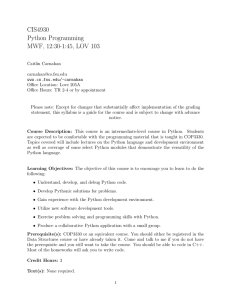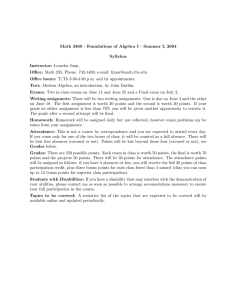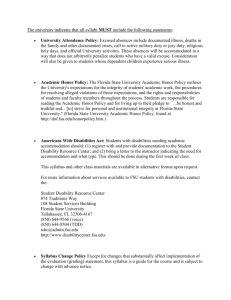CDA3101/CGS5268 Computer Organization II MWF, 2:00-3:15, HCB 315
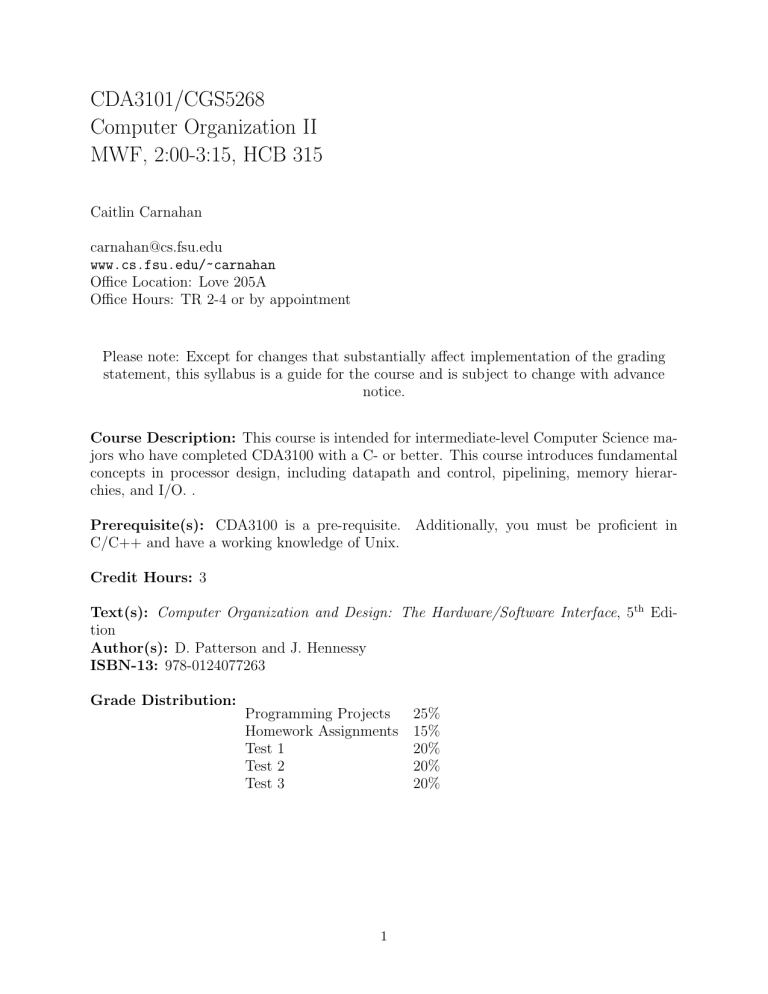
CDA3101/CGS5268
Computer Organization II
MWF, 2:00-3:15, HCB 315
Caitlin Carnahan carnahan@cs.fsu.edu
www.cs.fsu.edu/~carnahan
Office Location: Love 205A
Office Hours: TR 2-4 or by appointment
Please note: Except for changes that substantially affect implementation of the grading statement, this syllabus is a guide for the course and is subject to change with advance notice.
Course Description: This course is intended for intermediate-level Computer Science majors who have completed CDA3100 with a C- or better. This course introduces fundamental concepts in processor design, including datapath and control, pipelining, memory hierarchies, and I/O. .
Prerequisite(s): CDA3100 is a pre-requisite.
Additionally, you must be proficient in
C/C++ and have a working knowledge of Unix.
Credit Hours: 3
Text(s): Computer Organization and Design: The Hardware/Software Interface , 5 th tion
Author(s): D. Patterson and J. Hennessy
ISBN-13: 978-0124077263
Edi-
Grade Distribution:
Programming Projects 25%
Homework Assignments 15%
Test 1
Test 2
Test 3
20%
20%
20%
1
Letter Grade Distribution:
> = 93.00
A 73.00 - 76.99
C
90.00 - 92.99
A70.00 - 72.99
C-
87.00 - 89.99
B+ 67.00 - 69.99
D+
83.00 - 86.99
B 63.00 - 66.99
D
80.00 - 82.99
B60.00 - 62.99
D-
77.00 - 79.99
C+ < = 59.99
F
Course Policies:
• Grading
To receive a passing grade for the course overall, you must receive a combined passing grade according to the weight distribution shown in the table above. At the instuctor’s discretion, the lowest grade in a category may be dropped and/or extra credit opportunities may be given.
• Exams
This course includes three exams. Each exam will be non-cumulative, only covering the material specified for that exam. However, since these exams cover a smaller range of material, you should expect that they will be testing the material in-depth. Exam dates will be announced well ahead of time. If you are absent during an exam, you will receive a grade of 0 unless your absence has been cleared with me beforehand. In the case of extreme circumstances beyond your control, you must come talk to me about the possibility of making up the missed exam.
• Projects and Assignments
All assignments are mandatory and part of the final grade. There will be 2-3 programming projects in this course. Homework assignments consist of short-answer questions, essays, or problems. You are expected to work individually on both the projects and the assignments. Projects or assignments that are submitted beyond the due date will be accepted up to 48 hours after the due date and penalized 10% for each day that they are late. Your integrity as a student is taken very seriously in this course. Absolutely no cheating will be allowed. Be aware that “working a little too closely” is not a valid excuse and students who intend to help other students may be subjecting themselves to penalties for cheating. If you are having trouble with an assignment, you need to come see me or the TAs. We will gladly give you as much help as you need. All project submissions will be submitted through anti-plagiarism detection software.
• Attendance and Absences
Attendance is vital to your success in this class. For that reason, attendance is mandatory. If you are absent for any reason, you will still be responsible for any material covered on days you have missed. Accomodations may be made for excused absences.
Excused absences include documented illness, deaths in the family and other documented crises, call to active military duty or jury duty, religious holy days, and official
University activities. These absences will be accommodated in a way that does not arbitrarily penalize students who have a valid excuse. Consideration will also be given to students whose dependent children experience serious illness. If you are unsure whether your absence is excused or not, please come talk to me beforehand. As usual, first day
2
attendance will be recorded and students who are absent will be dropped from the course as indicated by the university’s First Day Attendance policy.
Academic Honor Policy
The Florida State University Academic Honor Policy outlines the University’s expectations for the integrity of students’ academic work, the procedures for resolving alleged violations of those expectations, and the rights and responsibilities of students and faculty members throughout the process. Students are responsible for reading the Academic Honor Policy and for living up to their pledge to “. . . be honest and truthful and . . . [to] strive for personal and institutional integrity at Florida State University.” (Florida State University
Academic Honor Policy, found at http://fda.fsu.edu/Academics/Academic-Honor-Policy.)
ADA
Students with disabilities needing academic accommodation should:
(1) register with and provide documentation to the Student Disability Resource Center; and
(2) bring a letter to the instructor indicating the need for accommodation and what type.
This should be done during the first week of class.
This syllabus and other class materials are available in alternative format upon request.
For more information about services available to FSU students with disabilities, contact the:
Student Disability Resource Center
97 Woodward Avenue, South
108 Student Services Building
Florida State University
Tallahassee, FL 32306-4167
(850) 644-9566 (voice)
(850) 644-8504 (TDD) sdrc@admin.fsu.edu
http://www.disabilitycenter.fsu.edu/
3
